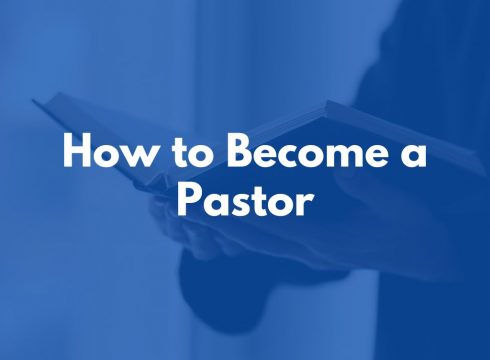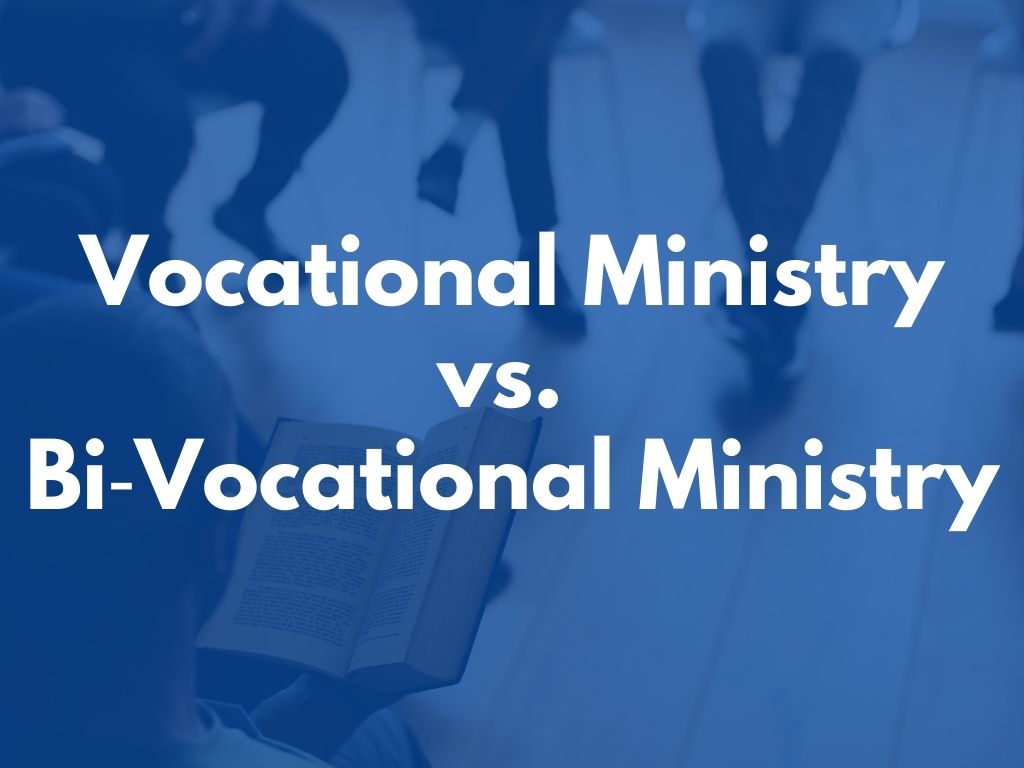HOW DO YOU BECOME A PASTOR?
If you have received a calling from God to take on a leadership role in your faith, becoming a pastor is one impactful way to serve. By becoming a pastor, you can spread joy, excitement, and faith through God’s word and acts of service. The road to becoming a pastor may seem overwhelming at first, but with the guidance of the Holy Spirit and hard work, you can acquire all of the skills and knowledge you need to lead God’s children.
WHAT IS A PASTOR?
When most people imagine what it means to be a pastor, they often think of a person preaching to the congregation on Sunday mornings. While this is one very essential type of service a pastor can provide, there are many paths for pastors to honor God’s call to ministry. Ultimately, the role of a pastor is to shepherd disciples of the Lord in their faith, interpret God’s teachings, and be of service to members of their flock.
LEAD PASTORS
A lead pastor is perhaps your quintessential idea of what a pastor should be. Lead pastors teach the gospel and guide congregations through their sermons and interpretations of Bible passages. Communities look to lead pastors for perspective and ways to incorporate God’s word into their everyday lives. Lead pastors minister to their flock both from the pulpit and one on one, addressing individual needs with the same care and compassion they preach.
YOUTH PASTORS
Youth pastors are essential in cultivating faith in the hearts and minds of the youngest members of their congregation. They work directly with children and teens, breaking down and explaining complex concepts in a way that resonates with developing minds. In the same way that a lead pastor also ministers to the individual needs of members of the congregation, youth pastors minister to the needs of the children and teens in their youth groups.
CHRISTIAN EDUCATION PASTORS
Many churches offer after-school faith-based education for children or Sunday School programs to provide access to learning and religious studies outside of weekly services. Faith-based classes are also offered to adults in Bible study and discipleship groups. A pastor engaged in Christian Education oversees the teaching of these courses, shaping the curriculum and guiding others in their faith inside a classroom setting.
COUNSELORS
While many pastors provide pastoral care and spiritual counseling, some pastors may be called to pursue additional training to serve as Christian Counselors. Such counselors offer some of the same services as traditional counselors, but with the backing of God’s teachings and the Holy Spirit as a guide. Christian Counselors also need to have the proper degrees and certifications in psychology to practice. Becoming a counselor is an impactful way to help those experiencing difficult times navigate their situations through faith.
MISSIONARIES
Missionaries aim to find those without faith or who may be questioning what they’ve been taught and invite them into Christianity. Missionaries spread the Lord’s word and teachings, traveling to parts of the world where God calls them to serve. Missionaries are excited to share their faith with others and seek to broaden the reach of God’s teaching, creating disciples wherever they may go.
CHAPLAINS
Pastors are not limited to serving only those within their church. Chaplaincy might be the perfect fit for those who want to connect with, inspire, and lead others who are not involved with a local church. Chaplains minister to those in prisons, hospitals, military services, private organizations, and many other institutions. Chaplains create the feeling and sense of community of a church without a physical structure or resident congregation.
WHO SHOULD BECOME A PASTOR?
For those who have experienced a calling from God, becoming a pastor is one way to serve both God and others through a leadership role. While becoming a pastor is certainly not the only way to be of service, it is a route recommended to those who are excited to spread the gospel’s teachings and mentor others on their faith journeys. A pastor’s lifestyle is perhaps more of a vocation than a typical career, and with that comes the ability and opportunity to make a tremendous impact in the lives of others. If you feel that God’s calling you to lead others in service, through Christ’s teachings, with the guidance of the Holy Spirit, becoming a pastor may be the right fit for you.
WHY BECOME A PASTOR?
Becoming a pastor is a tremendous undertaking, but one with immeasurable rewards. As a pastor, you have the opportunity to spread the word of God, delivering God’s teachings to others and creating a community of people steeped in faith. Pastors foster the growth and expansion of their congregations, making disciples excited to share their faith with others. As a pastor, you are given the opportunity to help people through sermons and one-on-one interactions. You have the platform and skill set necessary to make a difference in the lives of so many followers of Christ.
WHAT ARE THE REQUIREMENTS TO BECOME A PASTOR?
After you have come to understand God’s calling, the road to becoming a pastor begins by making the decision to attend seminary school. Seminaries offer ministry degree programs, in addition to many other types of degree programs, that will properly educate and equip you to fulfill your calling.
At United Theological Seminary, several ministerial degree programs focus on the practice of ministry and Christian leadership. Acceptance into these programs comes down to three main factors:
- Faith and belief
- Academic ability
- Overall character
Commitment to your faith and belief is perhaps the most critical prerequisite to any seminary program. You may be asked to write essays and provide letters of recommendation regarding your faith during the application process. While the academic requirements will vary from seminary to seminary, most ask for a bachelor’s degree for admission to a master’s program and a master’s degree for admission to a doctoral program. While you don’t have to be at the top of your class, the seminary will need evidence of your ability to keep up with rigorous, graduate-level studies. Seminaries also consider your character, sometimes requiring a background check as part of your application.
HOW LONG DOES IT TAKE TO BECOME A PASTOR?
Each student has a different journey to becoming a pastor, and as such, the time it takes from beginning to completion will vary from student to student. Generally, master’s and doctoral ministry programs take two to four years to complete, with room for personalization and variation in between. Most people complete these programs while working full time or while maintaining other full-time commitments. While some courses of study offer online options, others are primarily provided in person in a classroom setting.
HOW DO YOU BECOME ORDAINED?
In many traditions, completing seminary is an important step toward ordination. Each church and religious denomination will have a different process for ordination, but it usually begins with a candidacy period. Sometimes this candidacy period can be served in tandem with your ministry degree program. During your candidacy period, you may be mentored and guided by an experienced pastor who will provide you with additional instruction as well as opportunities to lead. When this program is completed successfully, you will be ordained per your church’s guidelines and traditions.
TAKE THE NEXT STEPS WITH UNITED
If you’re looking for a top-notch post-graduate seminary, United Theological Seminary is the perfect place to further your education. We offer Master’s degrees ranging from ministry, and divinity, as well as theological studies. Our faculty are experienced professionals who are passionate about teaching and helping students grow in their knowledge and faith. For more information on our degrees, please visit our page on seminary degrees.
Contact our helpful team today to learn more about the opportunities our seminary offers!



